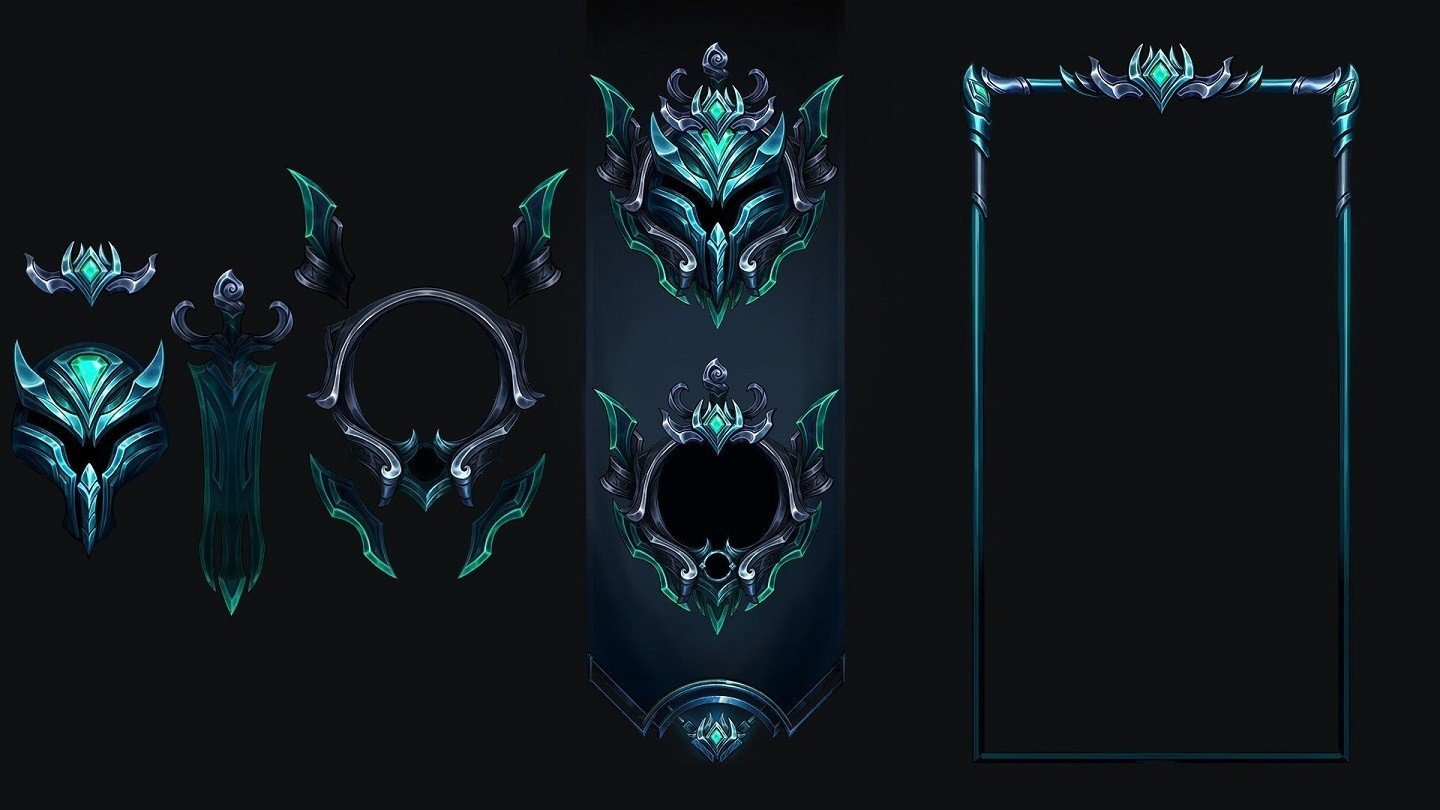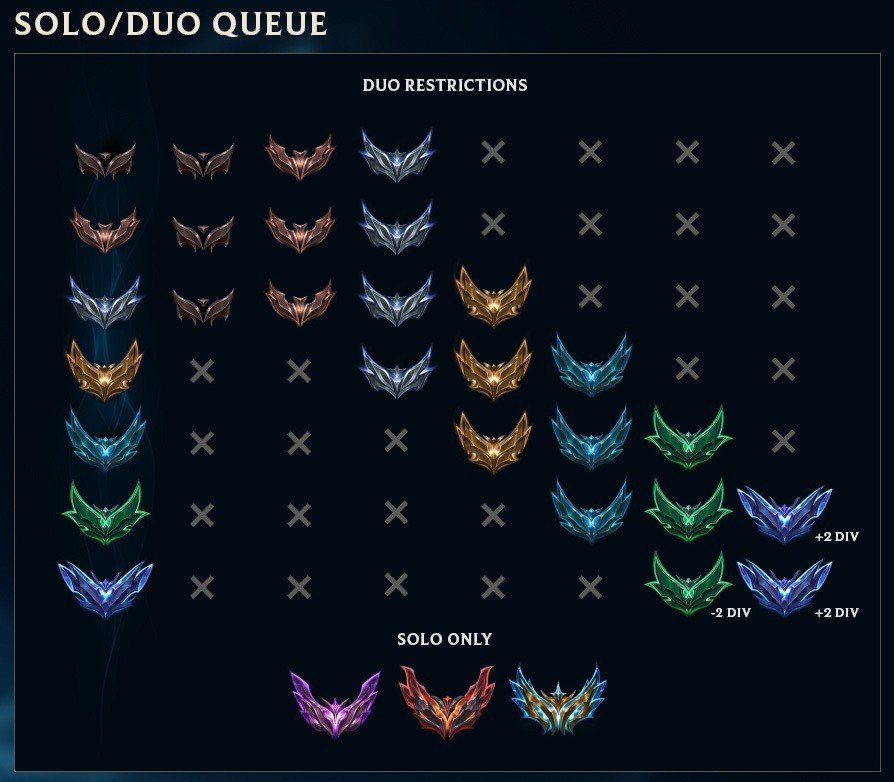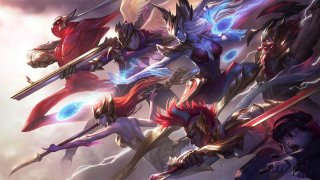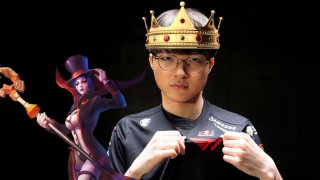Finding the right spot in the rating for each player in LoL is no easy task. Riot Games has tried to simplify this into straightforward ranks and divisions. However, the question arises: how does the game determine it? How does the League of Legends ranking system work? In fact, it's quite strange in places, so we'll explain everything in detail.
To start, to fully understand, one needs to consider the number that lies at the foundation of the system. Matchmaking rating (MMR) is the metric that Riot uses to determine a user's place in the rankings and to match players with allies and opponents. When users win, the rating increases. When they lose, it decreases. How can gamers find personal MMR? They can't, unless they are a programmer at Riot Games.
 Image: wallpaper.mob.org
Image: wallpaper.mob.org
The rating is a hidden indicator, specifically created to work with server systems to help ensure fair games. That was the developers' intention, at least. In reality, the system works oddly. Riot knows it needs to be rewritten, but unfortunately, that's too costly because the code is embedded in the game client. Since then, there have been many updates, all of which need to be taken into account.
Because of this burden, developers have no choice but to make modifications to the existing system. These layers have led to a situation where nobody really knows how the nuances of LP accrual and much more actually work, which we’ll explain further. We’ll look at official data about the current system, as well as the latest changes.
What are the ranks in LoL?
 Image: bayan-line.ru
Image: bayan-line.ru
MMR cannot be considered in isolation from everything else. It simply won't show an accurate skill level, so there's another system that converts hidden MMR into a more understandable format — ranks. While the rating indicates the overall skill level, it is an indicator of the current position. It helps you understand where you stand relative to other players.
The interaction between MMR and rank is hidden, but gamers can see the outcome. This is facilitated by another system — League Points (LP). They are necessary for moving between them. There are ten types in total, counting the recently added Emerald:
- Iron;
- Bronze;
- Silver;
- Gold;
- Platinum;
- Emerald;
- Diamond;
- Master;
- Grandmaster;
- Challenger.
 Image: ilomnews.ru
Image: ilomnews.ru
Reaching the higher ranks is just the first step. Once reaching the Master and beyond, to remain in the rating, players must continue to compete. If you do not play matches in this queue for several consecutive days, you’ll automatically start losing a certain amount of League Points each day. This decay only affects the highest lvl.
Win/loss of LP
 Image: Ensigame
Image: Ensigame
LP are awarded for wins and deducted for losses. They are used to bridge the gap between MMR and rank, so sometimes the amount of points gained or lost can vary significantly.
If after several games, you receive and lose approximately the same amount of points, it indicates that MMR matches current rank. If a player earns more LP and loses less, it suggests that their MMR is higher. Conversely, if a player gains fewer League Points and loses more, it indicates that their MMR is below.
 Image: Ensigame
Image: Ensigame
With each victory, both MMR + rank will rise, meaning you’ll slowly but surely progress through the rating. To raise it, players need a series of consecutive match victories. This demonstrates to the system that they deserve a higher position. The more victories, the more LP gamers earn.
However, everyone experiences setbacks. There are many reasons for this. Whatever causes a losing streak, it signals to the system that rank and rating no longer match. Until this discrepancy is resolved and the frequency of victories stabilizes, you’ll lose more LP with each defeat. If you find yourself in such a situation, try taking a break from the game or start choosing more comfortable champions to play with.
Divisions in League of Legends
 Image: support-leagueoflegends.riotgames.com
Image: support-leagueoflegends.riotgames.com
It also helps track progress, which is expressed through movement between divisions. Typically, to move up to the next, you need 100 LP. However, there are additional rules affecting progress, which we’ll discuss in later sections.
In LoL, divisions serve as steps that players climb toward a new rank. When a gamer gets there, they start at the lowest step. This continues up to Diamond, where the rules begin to change. From Iron to Diamond, each rank has four divisions.
 Image: support-leagueoflegends.riotgames.com
Image: support-leagueoflegends.riotgames.com
Previously, there was a skill check known as a promotional series that players had to pass to move to a higher rank. Developers have recently decided to eliminate this stage of the game.
Queues
 Image: Ensigame
Image: Ensigame
To differentiate between regular, solo/duo, and flex queues, each one uses its own MMR. This means that a losing streak in the flex queue will not affect the rating in the solo queue.
There is only one exception: the rating before the very first ranked qualification is calculated considering the MMR of the regular queue.
If there is a preference to play with friends, it is worth noting that groups have an advantage. The system accounts for this when forming matches. Because of this, you might face stronger opponents, or you might receive fewer points for a win.
How to avoid losing LP?
 Image: ru.wallpaper.mob.org
Image: ru.wallpaper.mob.org
In League of Legends, there is partial protection against losing League Points. Nobody wants to lose due to an ally's inaction. In such cases, protection is provided.
To qualify for this protection, certain conditions must be met:
- The player must be on the losing team.
- The user has more than 0 LP if they are in the fourth division.
- The inactive player was not part of a premade group.
It should be noted that penalties for inactivity or leaving the game reduce the amount of League Points received, not only in the game where the infraction occurred but also in subsequent games.
How does qualification work?
 Image: images.hdqwalls.com
Image: images.hdqwalls.com
Now you understand that every victory or defeat impacts MMR. Besides climbing the ranks, you can also face demotion. To know standing in the current season, users need to complete qualifications.
Players are required to play five qualification matches in the special queue. Not long ago, it was necessary to play ten such games, but the number and frequency of rank resets have been reduced. Based on the outcomes of these matches, you’ll be assigned a rank and division. The position depends on the number of victories, defeats, the strength of opponents. Also position in the previous season or pre-season.
 Image: ru.wallpaper.mob.org
Image: ru.wallpaper.mob.org
If you played matches in the last season, keep in mind that at the start of each new season, a partial rating reset is performed for all players. Therefore, a rank will likely be somewhat lower than the position you held previously. If you were at the highest lvl (Master and above) last season, your position at the beginning of the next season will not be higher than Emerald I.
During qualification, League Points are not lost. This means you’ll not fall below the initial rank that will be assigned after the first game in the qualification.
What do ranks provide in LoL?
 Image: game-geek.ru
Image: game-geek.ru
In League of Legends, rewards are prepared for achievements. Each rank provides an icon, a banner emblem, and a frame. In addition, each of them has unique rewards, most often in the form of skins.
Of course, the primary role of such a system is to differentiate players based on their skill levels. The rewards serve as a pleasant addition to the feeling of ascending to the top.
A compelling reason to raise your position might be that the friends are at a high rank and you simply cannot play with them in a special mode. In such cases, a player will have to navigate through various challenges laid out along the way.
 Image: support-leagueoflegends.riotgames.com
Image: support-leagueoflegends.riotgames.com
Do you think we are talking about victories over opposing teams? Certainly not. For that, you just need to play well. Random allies are full of surprises. To truly elevate from Iron, Bronze, a user needs to train until their skills surpass those of Silver. Then, they’ll be able to handle both the enemy team and their random allies.
For the reasons mentioned above, it is often harder for gamers to climb out of lower ranks than to maintain higher ones. Achieving a streak of victories in such conditions, where allies are novices, is nearly impossible. The LP awarding system just makes it harder for those already struggling.
Strange algorithms can take away a lot of points when you lose with a good score, and conversely, give very little for stunning victories. Perhaps someday Riot Games will rewrite the matchmaking and points system, but most likely, not any time soon.
Main image by DALL-E


 Vadim "Vadim" Dybinskiy
Vadim "Vadim" Dybinskiy


















0 comments